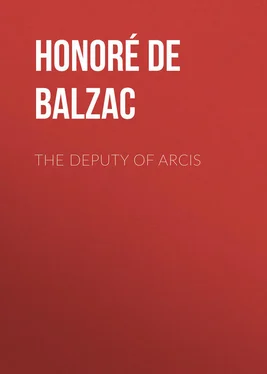Honoré Balzac - The Deputy of Arcis
Здесь есть возможность читать онлайн «Honoré Balzac - The Deputy of Arcis» — ознакомительный отрывок электронной книги совершенно бесплатно, а после прочтения отрывка купить полную версию. В некоторых случаях можно слушать аудио, скачать через торрент в формате fb2 и присутствует краткое содержание. Жанр: literature_19, foreign_antique, foreign_prose, на английском языке. Описание произведения, (предисловие) а так же отзывы посетителей доступны на портале библиотеки ЛибКат.
- Название:The Deputy of Arcis
- Автор:
- Жанр:
- Год:неизвестен
- ISBN:нет данных
- Рейтинг книги:3 / 5. Голосов: 1
-
Избранное:Добавить в избранное
- Отзывы:
-
Ваша оценка:
- 60
- 1
- 2
- 3
- 4
- 5
The Deputy of Arcis: краткое содержание, описание и аннотация
Предлагаем к чтению аннотацию, описание, краткое содержание или предисловие (зависит от того, что написал сам автор книги «The Deputy of Arcis»). Если вы не нашли необходимую информацию о книге — напишите в комментариях, мы постараемся отыскать её.
The Deputy of Arcis — читать онлайн ознакомительный отрывок
Ниже представлен текст книги, разбитый по страницам. Система сохранения места последней прочитанной страницы, позволяет с удобством читать онлайн бесплатно книгу «The Deputy of Arcis», без необходимости каждый раз заново искать на чём Вы остановились. Поставьте закладку, и сможете в любой момент перейти на страницу, на которой закончили чтение.
Интервал:
Закладка:
“If I have rightly understood what this meeting is for,” said Jean Violette, a stocking-maker, who had recently bought the Beauvisage house, “it is to pledge ourselves to support, by employing every means in our power, Monsieur Simon Giguet at the elections as deputy in place of Comte Francois Keller. If each of us intends to coalesce in this manner we have only to say plainly Yes or No on that point.”
“That is going too quickly to the point! Political affairs do not advance in that way, or there would be no politics at all!” cried Pigoult, whose old grandfather, eighty-six years old, had just entered the room. “The last speaker undertakes to decide what seems to me, according to my feeble lights, the very object we are met to discuss. I demand permission to speak.”
“Monsieur Achille Pigoult has the floor,” said Beauvisage, at last able to pronounce that phrase with all his municipal and constitutional dignity.
“Messieurs,” said the notary, “if there is a house in Arcis in which no voice should be raised against the influence of the Comte de Gondreville, it is surely the one we are now in. The worthy Colonel Giguet is the only person in it who has not sought the benefits of the senatorial power; he, at least, has never asked anything of the Comte de Gondreville, who took his name off the list of exiles in 1815 and caused him to receive the pension which the colonel now enjoys without lifting a finger to obtain it.”
A murmur, flattering to the old soldier, greeted this observation.
“But,” continued the orator, “the Marions are covered with the count’s benefits. Without that influence, the late Colonel Giguet would not have commanded the gendarmerie of the Aube. The late Monsieur Marion would not have been chief-justice of the Imperial court without the protection of the count, to whom I myself have every reason to be thankful. You will therefore think it natural that I should be his advocate within these walls. There are, indeed, few persons in this arrondissement who have not received benefits from that family.”
[Murmurs.]
“A candidate puts himself in the stocks,” continued Achille Pigoult, warming up. “I have the right to scrutinize his life before I invest him with my powers. I do not desire ingratitude in the delegate I may help to send to the Chamber, for ingratitude is like misfortune – one ingratitude leads to others. We have been, he tells us, the stepping-stone of the Kellers; well, from what I have heard here, I am afraid we may become the stepping-stone of the Giguets. We live in a practical age, do we not? Well, then, let us examine into what will be the results to the arrondissement of Arcis if Simon Giguet is elected. They talk to you of independence! Simon, whom I thus maltreat as candidate, is my personal friend, as he is that of all who hear me, and I should myself be charmed to see him the orator of the Left, seated between Garnier-Pages and Lafitte; but how would that benefit the arrondissement? The arrondissement would lose the support of the Comte de Gondreville and the Kellers. We all, in the course of five years, have had and shall have need of the one and of the others. Some have gone to the Marechale de Carigliano to obtain the release of a young fellow who had drawn a bad number. Others have had recourse to the influence of the Kellers in many matters which are decided according to their recommendation. We have always found the old Comte de Gondreville ready to do us service. It is enough to belong to Arcis to obtain admission to him without being forced to kick our heels in his antechamber. Those two families know every one in Arcis. Where is the financial influence of the Giguets, and what power have they with the ministry? Have they any standing at the Bourse? When we want to replace our wretched wooden bridge with one of stone can they obtain from the department and the State the necessary funds? By electing Charles Keller we shall cement a bond of friendship which has never, to this day, failed to do us service. By electing my good, my excellent schoolmate, my worthy friend Simon Giguet, we shall realize nothing but losses until the far-distant time when he becomes a minister. I know his modesty well enough to be certain he will not contradict me when I say that I doubt his election to the post of deputy.” [Laughter.] “I have come to this meeting to oppose a course which I regard as fatal to our arrondissement. Charles Keller belongs to the court, they say to me. Well, so much the better! we shall not have to pay the costs of his political apprenticeship; he knows the affairs of the country; he knows parliamentary necessities; he is much nearer being a statesman than my friend Simon, who will not pretend to have made himself a Pitt or a Talleyrand in a little town like Arcis – ”
“Danton went from it!” cried Colonel Giguet, furious at Achille’s speech and the justice of it.
“Bravo!”
This was an acclamation, and sixty persons clapped their hands.
“My father has a ready wit,” whispered Simon Giguet to Beauvisage.
“I do not understand why, apropos of an election,” continued the old colonel, rising suddenly, with the blood boiling in his face, “we should be hauled up for the ties which connect us with the Comte de Gondreville. My son’s fortune comes from his mother; he has asked nothing of the Comte de Gondreville. The comte might never have existed and Simon would have been what he now is, – the son of a colonel of artillery who owes his rank to his services; a man whose opinions have never varied. I should say openly to the Comte de Gondreville if he were present: ‘We have elected your son-in-law for twenty years; to-day we wish to prove that in so doing we acted of our own free-will, and we now elect a man of Arcis, in order to show that the old spirit of 1789, to which you owe your fortune, still lives in the land of Danton, Malin, Grevin, Pigoult, Marion – That is all!”
And the old man sat down. Whereupon a great hubbub arose. Achille opened his mouth to reply. Beauvisage, who would not have thought himself chairman unless he had rung his bell, increased the racket, and called for silence. It was then two o’clock.
“I shall take the liberty to observe to the honorable Colonel Giguet, whose feelings are easily understood, that he took upon himself to speak, which is against parliamentary usage,” said Achille Pigoult.
“I think it is not necessary to call the colonel to order,” said the chairman. “He is a father – ”
Silence was re-established.
“We did not come here,” cried Fromaget, “to say Amen to everything the Messieurs Giguet, father and son, may wish – ”
“No! no!” cried the assembly.
“Things are going badly,” said Madame Marion to her cook in the garden.
“Messieurs,” resumed Achille, “I confine myself to asking my friend Simon Giguet, categorically, what he expects to do for our interests.”
“Yes! yes!” cried the assembly.
“Since when,” demanded Simon Giguet, “have good citizens like those of Arcis made trade and barter of the sacred mission of deputy?”
It is impossible to represent the effect produced by noble sentiments on a body of men. They will applaud fine maxims, while they none the less vote for the degradation of their country, like the galley-slave who shouted for the punishment of Robert Macaire when he saw the thing played, and then went off and killed his own Monsieur Germeuil.
“Bravo!” cried several true-blood Giguet electors.
“You will send me to the Chamber,” went on Simon, “if you do send me, to represent principles, the principles of 1789; to be one of the ciphers, if you choose, of the Opposition, but a cipher that votes with it to enlighten the government, make war against abuses, and promote progress in all things – ”
Читать дальшеИнтервал:
Закладка:
Похожие книги на «The Deputy of Arcis»
Представляем Вашему вниманию похожие книги на «The Deputy of Arcis» списком для выбора. Мы отобрали схожую по названию и смыслу литературу в надежде предоставить читателям больше вариантов отыскать новые, интересные, ещё непрочитанные произведения.
Обсуждение, отзывы о книге «The Deputy of Arcis» и просто собственные мнения читателей. Оставьте ваши комментарии, напишите, что Вы думаете о произведении, его смысле или главных героях. Укажите что конкретно понравилось, а что нет, и почему Вы так считаете.












